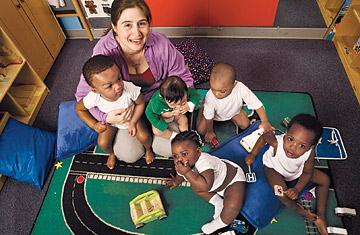
Joanne Goldblum with babies.
It's often the little things that change your life. For Joanne Goldblum, it was toilet paper. As a social worker in Connecticut, she kept noticing that the families she worked with didn't have any. Eventually a client told her that TP isn't covered by food stamps or any other government-assistance program, so people just improvise. (Fast-food napkins, anyone?) In fact, no hygiene supplies are covered--including diapers.
"I saw a mother take a diaper off, empty the solids and put it back on," says Goldblum. Not having enough diapers, she realized, has far-reaching effects. "Most day-care centers require parents to provide their own," she says. And without day care, parents can't look for work or go to school. Cloth diapers don't help, because low-income families tend not to have washing machines or cars to get to the Laundromat. Moreover, she knew that babies who sit longer in their own waste get more diaper rashes and cry more. And she'd read the studies showing that more crying leads to more physical abuse.
This is how Goldblum came, five years ago, to start the Diaper Bank (a name, she notes, that sounds less comical--and is easier to raise funds for--than the Toilet Paper Bank). These days, she gives away 200,000 diapers a month in Connecticut, mostly to public-housing authorities, tenants' groups and agencies that work with low-income families.
For the first three years, she drove the diapers around herself and learned to use a pallet jack; today she has two full-time employees and buys 250,000 diapers at a time straight from a manufacturer. She has yet to find any makers who will give them to her free. Goldblum, who works on the project full time but does not draw a salary, has talked to some 50 people about starting diaper banks. "We know of six who have taken the next step," she says.
She advises them to start small. But her dreams are getting bigger. Because children with dirty clothes and bodies have a tough time at school, she'd like to see laundry machines and showers there. She'd like federal assistance programs to start covering some hygiene items. And she'd like the average citizen to realize how hard it is for people to function at the poverty line. Failing that, she'll settle for free diapers.
FOR MORE DETAILS Download a free how-to manual at thediaperbank.org
